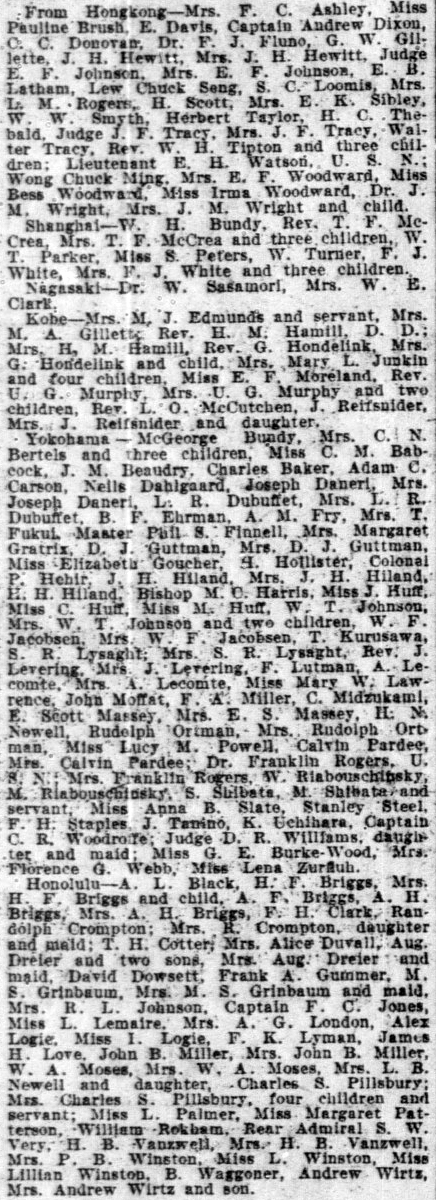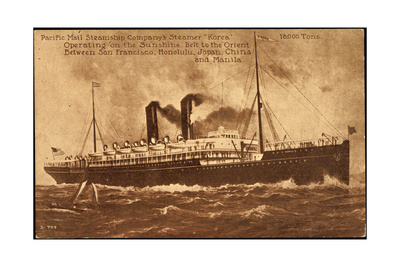Passengers at the Port of San Francisco: 1870s

SS City of Korea
Arrivals/Departures San Francisco
SS City of Korea
During the 1870s
April 5, 1903, San Francisco Call
LOCAL MARKETS
Exchange and Bullion
The Korea took out for Hongkong a treasure list of $241,646 in mexican Dollars and $890 in Gold Coin. The Assistant United State Treasurer also shipped to W. F. McLelland, Honolulu, $700,000 in Gold Coin and $300,000 in Currency.
January 26, 1904, San Francisco Call
The steamer Korea brought 3,400,000 Japanese gold yet from Yokohama, consigned to the following institutions: Hongkong and Shanghai Banking Corporation, 1,500,000; Anglo-California Bank (Limited), 1,500,000, and International Bankign Corportion, 400,000. The total value of these shipments is $1,658,125.
April 17, 1904, San Francisco Call
A Valuable Cargo
The cargo of the Korea, which sailed yesterday for the Orient, was very valuable, exceeding $600,000. Japan was heavily represented on the manifests, as over $500,000 of thetotal was consigned to her ports. Among her invoices were 423 packages electric railway equipment, valued at $43,507; 8074 steel rails at $200,000, and 31,462 centals Barley at $35,400.
Steamer Korea arrived San Francisco April 29, 1908: Sandberg, 26 days, 10 hours and 19 minutes from Hongkong, via Yokohama 15 days 9 hours and 23 minutes, via Honolulu 5 days 12 hours and 8 minutes.
April 30, 1908, San Francisco Call
Shipping News and Gossip of the Waterfront
Liner Korea Brings a Great Crowd of Passengers from the Far East
The Pacific Mail liner Korea, Captain Sandberg, arrived yesterday from the orient with a large number of passegers and 5,598 tons of cargo. The freight included 479 bales of raw silk, 7,158 rolls of matting, and 3,368 bales of gunnies. The Korea's cabin passengers exceeded in numbers the cabin berths and accommodations were fixed for about a score from Honolulu in the steerage. Despite the crowding no complaints came from the passengers, whose unanimous declaration that they had a fine time might be taken as an eloquent tribute to the diplomatic skill of the purser and stewart and a testimonial to the cook.
Among the passengers were four insular magistrates coming home from the Philippines, on leave of absence. They were judges E. F. Jahnson, J. T. Tracy, D. R. Williams and Adam C. Carson.
Mrs. E. F. Woodward, wife of the surveyor of the port, and her two daughters returned on the Korea after a trip to the orient. The passengers incluided several missionaries and a party of British tourists. There were also many Japanese merchants and a number of American naval officers who have finished their tour of duty on the Asiatic station and are home for new orders.
The Korea's passengers included:
From the April 30, 1908, San Francisco Call

April 30, 1908, San Francisco Call
BANQUET TO LEVERING
Joshua Levering of Baltimore, candidate for president in 1900 on teh prohibition ticket, and one of the arrivals on the Korea from the orient, where he had been investigating Chrisitian missions will be tendered a banquet by prominent churchmen at teh St. Francis hotel tomorrow night. Rev. E. E. Kelly will preside and Bishop Nichols will deliver and address. Levering will speak of his impressions gained on the trip. Preliminary steps in the formation of a San Francisco auxiliary of the laymen's missionary movement, in which Levering is prominent as a worker, will be taken.
April 30, 1908, Los Angeles Herald
KOREANS SEEK LIFE OF METHODIST BISHOP
FEDERAL OFFICERS ACT AS RCDY GUARD
Rev. Mr. Harris, Traveling from Orient to Baltimore,
Is Object of Plot Hatched in San Francisco
By Associated Pros.
SAN FRANCISCO, April 29. Warned that a number of Koreans in San Francisco were preparing to assassinate the Rev. Bishop Merrlman Culbert Harris upon his arrival here this morning on the Pacific Mail liner Korea from the Orient, Surveyor of the Port Woodward, accompanied by a number of other federal attaches and members of the local police force, met the steamer upon its appearance in port and placing the divine aboard the revenue cutter Golden Gate, caused his removal to Oakland.
The action of the government officials came in response to a request from Washington. As a companion of the late Durham W. Stevens, counselor to Korea, who was shot down at the ferry depot while on his way to Washington, and one who had studied conditions in Korea under the Japanese rule. Bishop Harris was warned by the American ambassador to Japan and a Japanese missionary before leaving the Orient not to make any statements on the Korean question upon his arrival at San Francisco which might be likely to arouse Korean residents of this city.
While the bishop was making his way across the Pacific on the liner Korea, a number of telegrams were received from Washington by local federal officers to the effect that a plot to murder the missionary had been formed among the Koreans of this city and the surveyor of the port was directed to take every possible means of safeguarding the divine during his stay here.
Bishop Harris, who Is on his way to attend the general conference of the Methodist Episcopal church to be held In Baltimore next month, when seen on the Korea, said: "I might state that my work in Korea has been a long missionary service, and I am not affiliated with any political movement regardless of any statements to the contrary. I am friendly to both the Koreans and Japanese and am at a Joss to understand why any one should plan to harm me. I have never given utterance to any statements likely to arouse feeling against me among the Koreans."
May 2, 1908, Los Angeles Herald
KOREANS DENY THEY SOUGHT TO MURDER BISHOP HARRIS
By Associated Press.
SAN FRANCISCO, May 1. T. S. Ahrn, a prominent member of the local Korean colony, speaking for his fellow countrymen today, emphatically denied that there was any truth In the rumor that a plot had been formed to assassinate Bishop Harris of the Methodist Episcopal church on his arrival In this city. He says the report, which, according to a cable message appears to have originated in Honolulu, had absolutely no foundation in fact. The Koreans, Ahrn said, did not even know the bishop was coming here. They all know of his good work in Korea and greatly appreciated his efforts in behalf of their people. He had their highest respect and they deeply regretted the circulation of rumor to the contrary. Had the opportunity been afforded a delegation of Koreans would have called on Bishop Haris in order to pay their respects and express regret that he had been put to so much unnecessary annoyance.
June 9, 1908, Los Angeles Herald
PACIFIC MAIL S.S.
|
July 30, 1908, San Francisco Call
Arrived Island Ports: Honolulu, July 29, Steamer Korea
July 19, 1908, San Francisco Call
Hay and Feedstuffs
The steamer Korea brought up 10,580 sacks of bran from japan, whcih causs an easier feeling in this article, though quotations show to further change. This Japanese bran is rich red and is selling at $29.50@30.






 Copyright ~ 1998-2018.
Copyright ~ 1998-2018. 